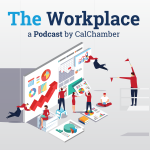The California Legislature has one final month to pass bills to the Governor before going on recess for the rest of the year.
In this week’s episode of The Workplace, CalChamber President Allan Zaremberg, and CalChamber Executive Vice President Jennifer Barrera update listeners on the status of important pending legislation that will have a huge impact on employers and California’s economy—legislation on the Dynamex decision, privacy, pay for striking workers, and arbitration agreements.
Employees vs. Independent Contractors
One of the most important bills moving through the Legislature is AB 5 (Gonzalez; D-San Diego), Barrera, who heads the CalChamber policy team, tells Zaremberg.
AB 5 codifies into the Labor Code the court decision in Dynamex Operations West, Inc. v. Superior Court of Los Angeles, which rejected the long-standing Borello test (where employer control over the worker was a key) and adopted the “ABC” test for determining whether workers should be classified as either employees or independent contractors.
The bill also carves out exemptions from the “ABC” test for certain professions, reverting those industries back to the Borello standard, which is much more flexible, Barrera explains.
“For example, insurance agents are carved out, hair stylists, doctors, lawyers, accountants, direct sellers—there’s a list of different professions and industries that are currently carved out under AB 5,” she says.
What is particularly problematic in the “ABC” test is the “B” factor, which requires that an independent contractor perform work which is outside the usual course of the hiring party’s business.
“That makes it difficult for doctors in rural hospitals, and real estate agents who are in the real estate profession, and you can go on and on and on, and that doesn’t work for everybody” Zaremberg says.
Barrera agrees.
“Exactly. Which is why you see so many exemptions being added to AB 5 right now—it’s because it doesn’t work for everyone,” Barrera replies.
More exemptions are expected to be added to AB 5, Barrera says, including an exemption for business-to-business contracts, which were never contemplated to fall under the ABC test.
Zaremberg points out that the Dynamex case was brought before the courts before the iPhone was ever introduced, and thus before the gig industry played such a big part in the state’s economy. The facts of the case were such that the workers would have been employees under the Borello test, Barrera comments.
Although AB 5 does not address the gig economy, Barrera says, “It is not out of the realm of possibility that there may be additional legislation introduced to specifically address the gig economy in relation to the Dynamex decision.”
Bills to Fix Privacy Law Stalled
Taking effect on January 1 is a new privacy law that limits the use of consumer data by all businesses. The law, which passed after only a week of consideration in the Legislature, contains several challenges that could harm consumers and has far-reaching impacts.
For example, Zaremberg says, consumers cannot obtain a FICO score without data, and loyalty programs depend on shopping habits and history to issue discounts.
Moreover, Zaremberg points out, although Europe recently passed privacy laws as well, the European Union took 4 years to craft its laws, while California’s lawmakers drafted the California Consumer Privacy Act in only 5 days.
“After the law was passed, the business community really came together and tried to narrow down the changes and the fixes that were necessary to protect consumers as intended by the bill and also to allow the businesses to implement the law,” Barrera explains. “There was a list of bills that were doing just that…and they all passed out of the Assembly, but were unfortunately stalled in the Senate.”
Pay for Striking Workers
Still moving through the Legislature is AB 1066 (Gonzalez; D-San Diego), which would allow employees on strike to receive unemployment benefits if the strike lasts more than four weeks. The bill would not only burden the Unemployment Insurance (UI) Fund, but also would burden employers, who pay into that fund, Barrera says.
“So the employer pays into it to pay workers who are voluntarily striking and leaving their company and leaving them at risk for losing business,” Zaremberg says.
And that was never the intention of the UI Fund, Barrera stresses.
“The Unemployment Insurance Fund was for individuals who, through no fault of their own, don’t have a job anymore,” she says. “And that is not the case when you have employees who are out on strike, voluntarily…because they just are asking for more benefits, or higher pay, etcetera, and they’ve decided to walk away from their job in an effort to leverage that.”
Also concerning is the fact that the UI Fund went bankrupt during the recession due to a shortage of funds. The state was forced to borrow $10 billion from the federal government, and employers were then taxed to pay back that loan, Barrera says.
As it stands, the fund is barely solvent, and overburdening the fund runs the risk of bankrupting it again, Zaremberg warns.
Ban on Arbitration Agreements
The last bill discussed on the podcast is AB 51 (Gonzalez; D-San Diego), which would ban arbitration agreements made as a condition of employment.
Under the bill, “every dispute would have to go to court,” Barrera says.
“Employers don’t utilize arbitration because they want to get out of any liability or they want to not resolve a dispute with an employee,” she explains. “They utilize arbitration because they want to get away from the court costs and attorneys’ fees associated with protracted litigation that can take five to seven years to resolve, whereas arbitration can be resolved in a year or less.”
AB 51 is similar to past legislation vetoed by Governor Edmund G. Brown Jr. for plainly violating federal law. If passed, the bill would create more cost, litigation and uncertainty for employers, who would have to wait until a court definitively resolves the conflict with federal statute, Barrera says.


